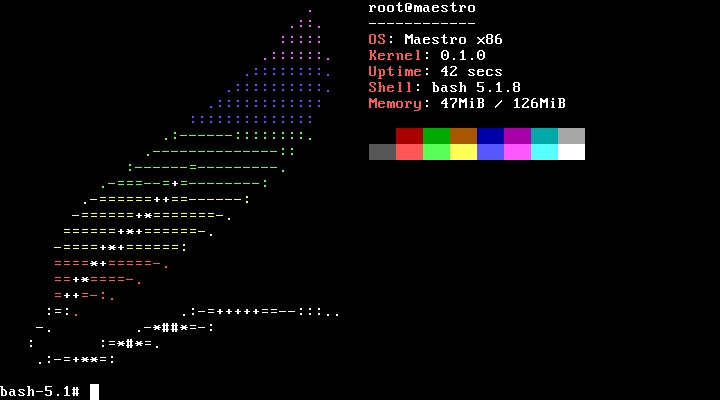- cross-posted to:
- rust@lemmit.online
- cross-posted to:
- rust@lemmit.online
Enter Maestro, a unix-like monolithic kernel that aims to be compatible with Linux in order to ensure wide compatibility. Interestingly, it is written in Rust. It includes Solfége, a boot system and daemon manager, maestro-utils, which is a collection of system utility commands, and blimp, a package manager. According to Luc, it’s creator, the following third-party software has been tested and is working on the OS: musl (C standard library), bash, Some GNU coreutils commands such as ls, cat, mkdir, rm, rmdir, uname, whoami, etc… neofetch (a patched version, since the original neofetch does not know about the OS). If you want to test it out, fire up a VM with at least 1 GB of ram.



Programmers are hyped about Rust. It’s a programming language that has a legitimate chance to replace C and C++ for performance critical applications. So any new project in Rust increases the possibility of a future where C and C++ are programming languages of the past.
Removed by mod
Yeah the syntax is pretty far from more established languages, which is why I prefer C++ when I use it.
Imo rust won’t replace cpp without true Oop so I might just make my own objective rust and piss off Oop haters
There has been no true OOP language since smalltalk, which btw wasn’t class-based.
In practical terms Rust has subtyping – barely, at least in technical terms the only thing that uses true subtyping is lifetimes. In practical terms you have qualified types (aka traits) supporting interface inheritance which is perfectly proper as everybody knows that you shouldn’t inherit implementation as the Liskov Substitution Principle is undecidable.
“Language X will fail because it’s not OO” what’s this, the early 00s? I thought we left that hype train behind.
Removed by mod
That’s why you always quote what you’re replying to.
And I’m confused why I got two comments going into the OOP tangent, when I made no mention about it at all.
Removed by mod
No worries! I love conversations bashing on 00s-style OOP principles.
What is true OOP?
I’ve never used rust but as you say it really does seem like a good successor to c/c++. It’s a modern, more memory safe programming language shat allows you to dig into the weeds if you need it.